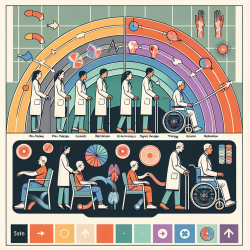In the quest to improve outcomes for children with social anxiety disorder (SAD), it's essential to rely on evidence-based approaches. The recent study titled "Integrative systemic and family therapy for social anxiety disorder: Manual and practice in a pilot randomized controlled trial (SOPHO-CBT/ST)" provides valuable insights into the efficacy of Integrative Systemic and Family Therapy (ISFT). This blog aims to help practitioners enhance their skills by implementing the research findings from this study or by encouraging further exploration into this therapy model.
Key Findings from the SOPHO-CBT/ST Study
The pilot randomized controlled trial (RCT) included 38 clients diagnosed with SAD. The participants were divided into two groups: one received ISFT, and the other received Cognitive Behavioral Therapy (CBT). Here are the significant findings:
- Reduction in Social Anxiety: Both ISFT and CBT showed significant reductions in social anxiety, but ISFT had a more substantial effect (ISFT: d=1.67; CBT: d=1.04).
- Remission Rates: The remission rate for ISFT was 78%, compared to 45% for CBT, based on blind diagnosticians’ ratings.
- Global Functioning: Improvements in global functioning were more pronounced in the ISFT group (ISFT: d=1.50; CBT: d=0.92).
- Psychological Functioning: ISFT led to significant improvements in psychological functioning (BDI-II: ISFT: d=1.71; CBT: d=0.50).
Implementing ISFT in Practice
ISFT offers a multi-dimensional approach that integrates solution-focused language, social network diagnostics, and genogram work. Here are some practical steps to implement ISFT effectively:
- Therapeutic Stance: Embrace radical constructivism and Cybern-Ethics, focusing on the meaningfulness of symptoms and the autonomy of clients.
- Multi-Person Settings: Include family members, friends, and other significant individuals in therapy sessions to leverage the collective power of the social system.
- Symptom Prescription: Use symptom prescription techniques to deliberately perform selected symptom components, reducing the symptomatology and increasing system- and self-efficacy.
- Choral Speaking: Implement choral speaking methods to externalize and question negative beliefs, turning self-doubt into rhythm and music.
Encouraging Further Research
While the pilot RCT provides promising results, more extensive studies are needed to confirm these findings and explore the long-term benefits of ISFT. Practitioners are encouraged to contribute to this growing body of research by conducting their own studies and sharing their experiences with the broader community.
Conclusion
Integrative Systemic and Family Therapy (ISFT) offers a robust framework for treating social anxiety disorder in children. By incorporating multi-person settings, symptom prescription, and choral speaking, practitioners can create a more supportive and effective therapeutic environment. To read the original research paper, please follow this link: Integrative systemic and family therapy for social anxiety disorder: Manual and practice in a pilot randomized controlled trial (SOPHO-CBT/ST).










